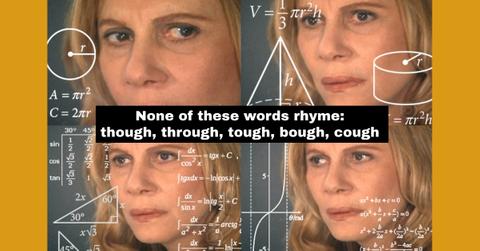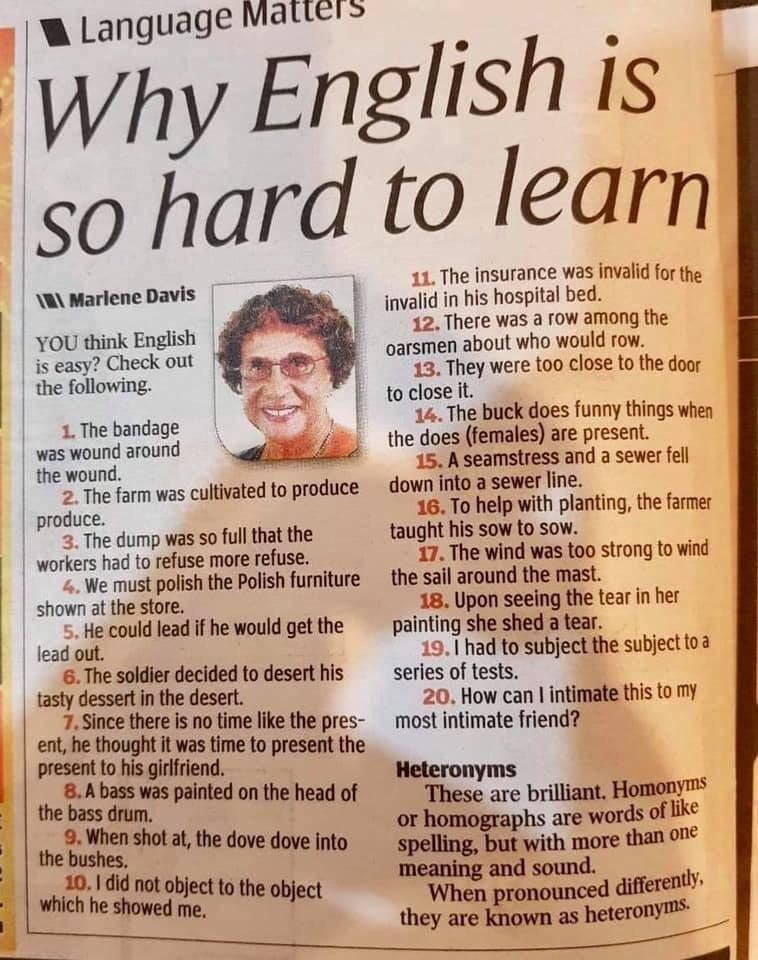Here's Proof That the English Language Is Super Hard and Makes No Sense
Updated July 1 2023, 11:27 a.m. ET

A screenshot of a page from what looks like a local paper is about to blow your mind. It's called "Why English Is So Hard to Learn," and it more than proves its point. If you are a native English speaker, you probably don't regularly think about all the strange pronunciation rules that we take for granted.
You just kind of know how to say "though," and "through," and "tough," and "cough," and "bough." But for people who are learning English as another language, these quirks make literally no sense. And there aren't really any standards or rules that you can learn ... The correct pronunciations of these words exist on a case by case basis.
It's hard to even write about how insane this is because the words look the same! Like, I can't be like, "Guys, it's crazy because 'wound' and 'wound!'" You know? By number 20, my brain was so jumbled I couldn't handle it.
You have to use context clues to determine which word you're supposed to use when, and even then, sometimes I get it wrong when I'm first reading these sentences ... And I've spoken English my whole life!
None of this would be an issue if we had consistent pronunciation of our vowels throughout the whole language. But there's a video that describes what the English language would sound like if that were the case, and it's truly wild. You might want to like, grab a pillow, because you're going to have to lie down after watching this.
I'll give you a minute to recover. Your brain probably has to unscramble himself after watching that. I know mine did. Someone asked the people of Reddit to share examples of why the English language is so hard to learn. And the examples are mind-boggling.
One native French speaker clarified that English isn't actually that hard to learn. Sentence construction-wise, it's fairly simple. It's just hard to master because of nonsensical pronunciations and "rules" that have a million exceptions.
One commenter offered even more examples of pronunciation mysteries in the English language. Why do "sight" and "site" sound the same? Why does "cry" rhyme with "buy?" "Taught" has two more letters than "taut," but they sound exactly the same and mean different things. Come on, people. What are we even doing here?
Then there are the subtle differences in phrases that really confuse FemaleMadness and soon, the rest of us too. They write, "'Few' means 'very little,' 'a few' means 'some,' and 'quite a few' means 'actually quite a lot but I'm just trying to make a point that it's still too little.'"

Every language has its quirks and exceptions to the rule, but English has way more exceptions than rules.
Austin-tatious cites this so-called rule, which has been the bane of my existence ever since I lost the fourth-grade spelling bee on the word "ancient" because I only thought about the first part of it: "I before E, except after C and when sounding like A as in neighbor and weigh, and on weekends, and holidays, and all throughout May, and you'll always be wrong no matter WHAT you say!"
I hate that rule.
Namkash thinks that the hardest thing about learning the English language is contractions. Because it wasn't hard enough that we make words impossible to pronounce. We also have to take some letters out of them and replace them with apostrophes.
Last but certainly not least, and honestly, not even really last, the fact that "Buffalo buffalo Buffalo buffalo buffalo buffalo Buffalo buffalo" is a full sentence is definitive proof that the English language makes little sense. There's a lot that is inexplicably complex about it.
That being said, all language is incredible and glorious and beautiful and poetic and gorgeous, and I love it so much. But "does" and "does?" Come on, people.
